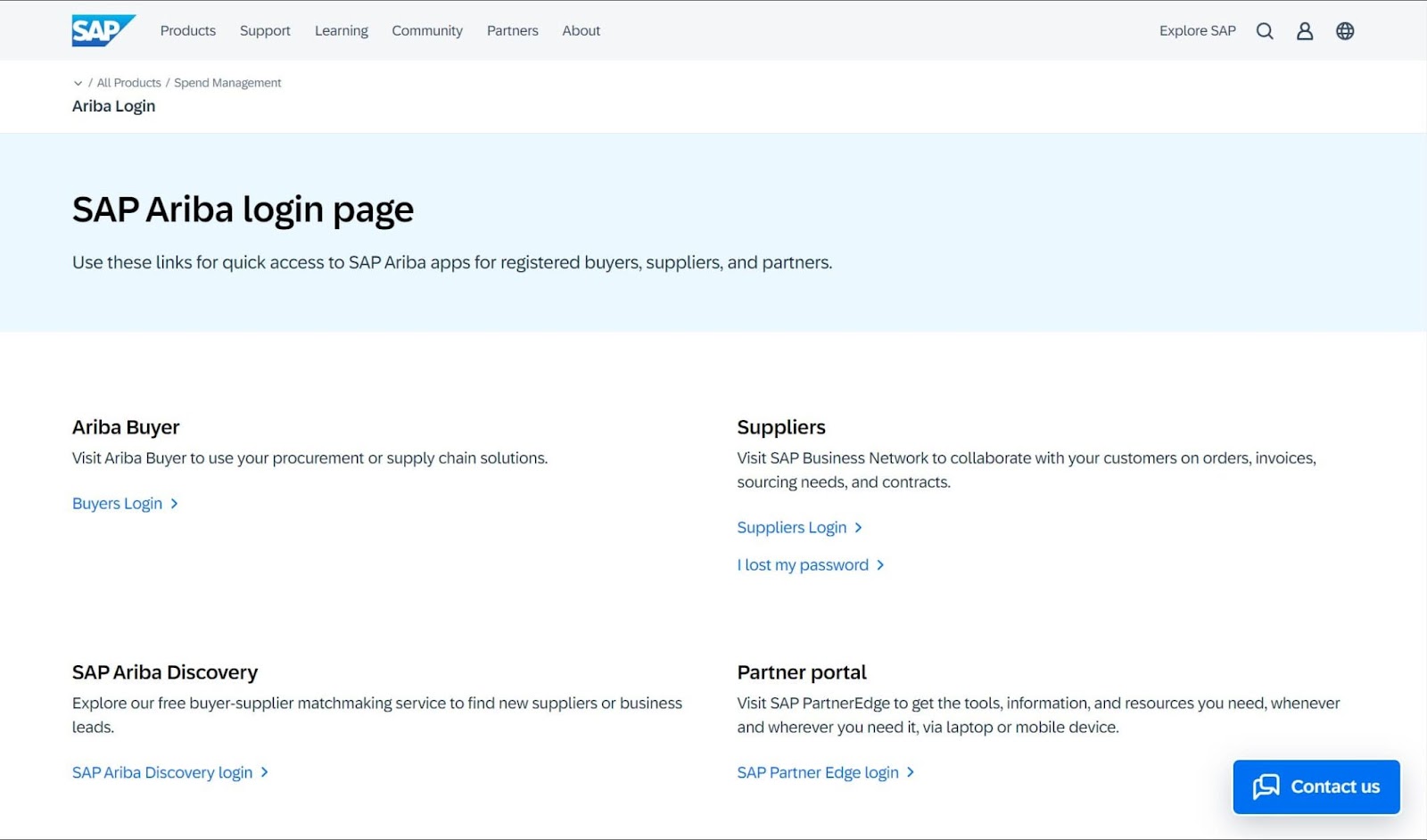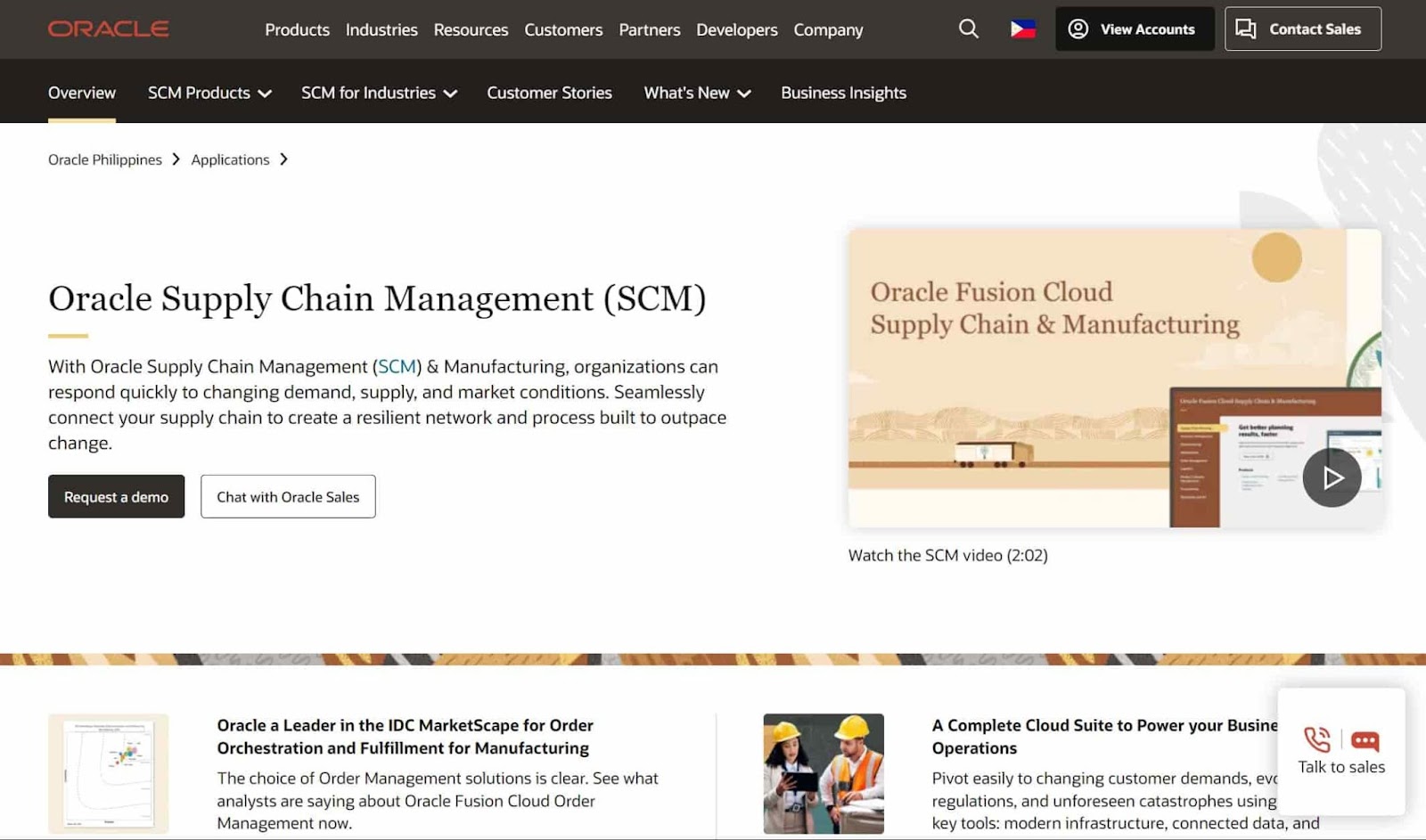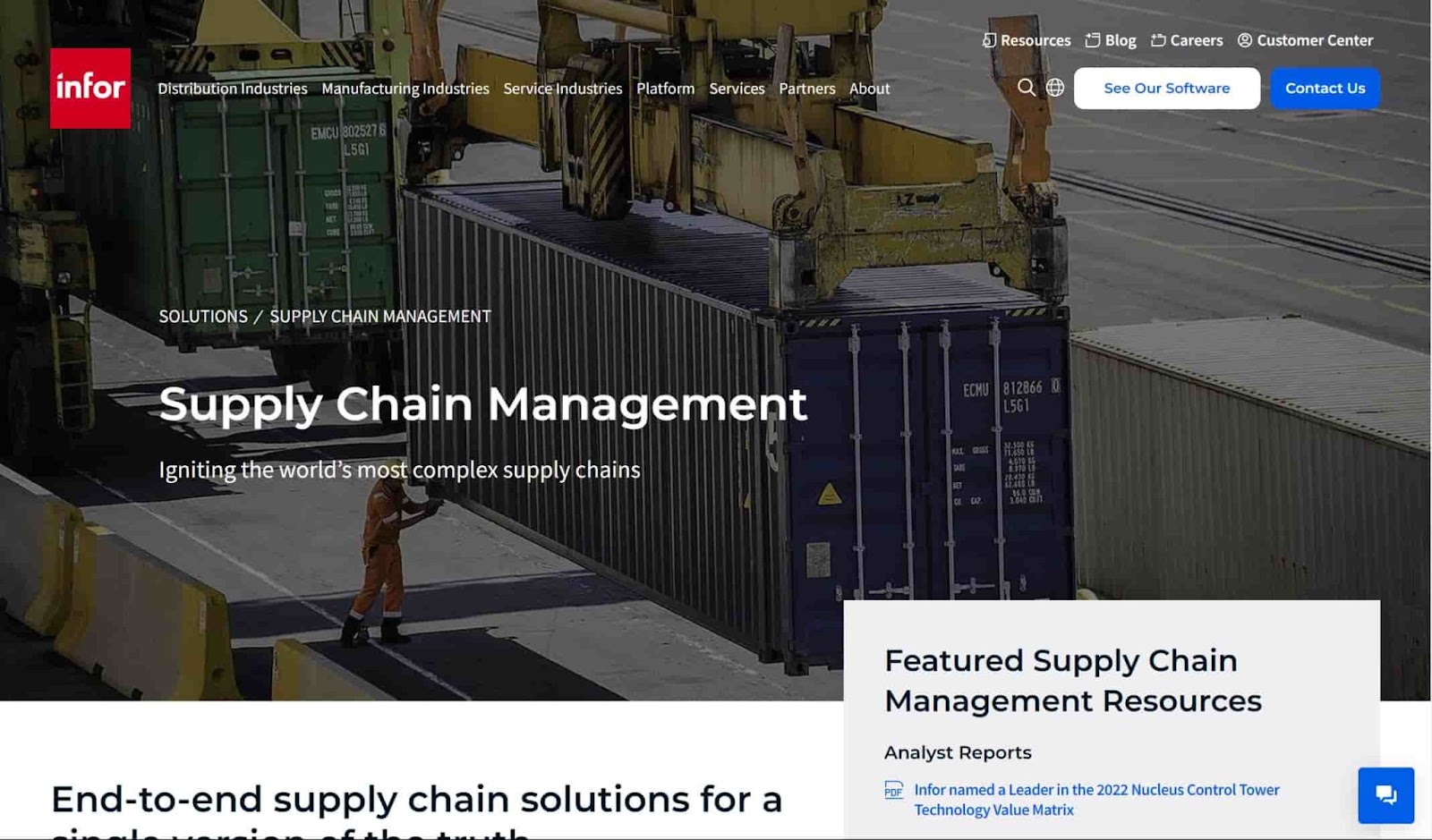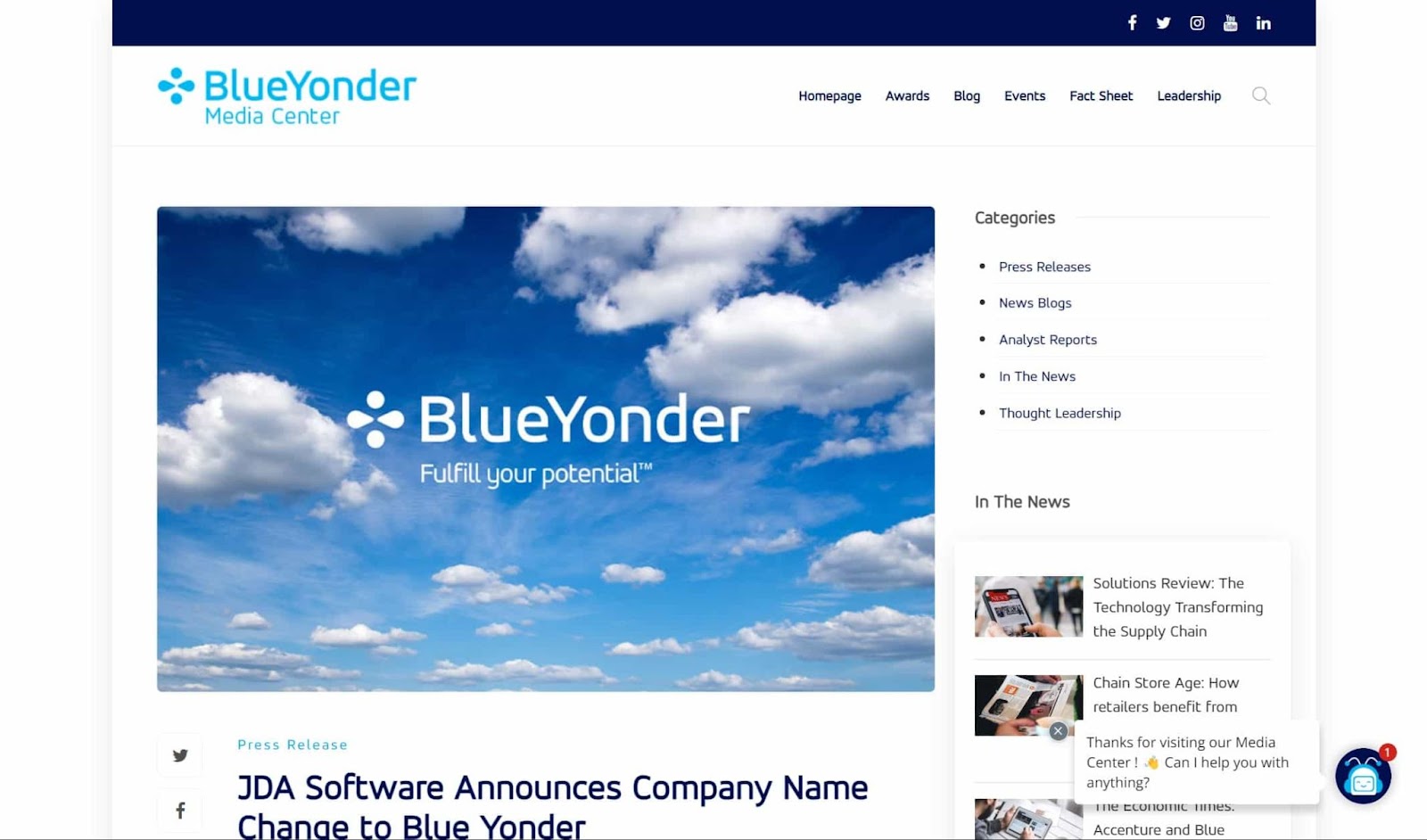There are so many choices for supply chain management software companies that it can be hard to pick the right one.
You can’t be sure which company is best for your needs because they all have different features, data, and integration options. You should think about things like cost, features, scalability, and how easy it is to use.
This choice is very important for improving your business’s general performance and supply chain operations. By comparing the different choices, you can find the SCM program that meets all of your needs.
What are Supply Chain Management Software Companies?
Supply Chain Management (SCM) software companies develop and provide tools that help businesses manage the flow of goods, information, and finances as products move from supplier to manufacturer to wholesaler to retailer to consumer.
These companies offer solutions for various aspects of supply chain operations, including procurement, production planning, inventory management, transportation, and logistics.
Their software helps businesses optimize efficiency, reduce costs, and improve overall supply chain performance by providing real-time data and analytics, facilitating better decision-making, and enhancing collaboration among all parties involved in the supply chain.
Criteria for Comparison of the Best Supply Chain Management Software Companies
To determine the best SCM software for your business, it is essential to consider various criteria that impact the effectiveness and efficiency of supply chain operations. These criteria include:
A. Key Features and Functionalities
- Inventory Management: Efficient tracking and management of inventory levels to meet demand without overstocking or stockouts.
- Order Processing: Streamlined processes for handling orders from initiation to fulfillment.
- Demand Forecasting: Accurate demand planning to anticipate customer needs and adjust supply chain activities accordingly.
- Supplier Management: Effective management of supplier relationships and performance.
- Logistics and Transportation: Coordination and optimization of transportation management for timely and cost-effective delivery of goods.
- Reporting and Analytics: Comprehensive reporting tools and analytics to monitor supply chain performance and inform decision-making.
B. Ease of Use and User Interface
- Intuitive design and user-friendly interfaces that facilitate ease of use and minimize training time.
C. Integration Capabilities
- Ability to integrate seamlessly with other business systems such as ERP and CRM to ensure smooth data flow and operational efficiency.
D. Scalability and Flexibility
- Adaptability to business growth and changes, offering scalability and customization options to meet evolving needs.
E. Customer Support and Training
- Availability and quality of customer support and training resources to assist users in maximizing the software’s potential.
F. Cost and Pricing Models
- Transparent pricing structures and cost-effectiveness, considering both initial investment and total cost of ownership.
G. User Reviews and Satisfaction
- Feedback and satisfaction ratings from actual users, providing insights into the software’s real-world performance and reliability.
Overview of Leading SCM Software Companies
To help you make an informed decision, we will provide an overview of some of the leading supply chain management software companies, highlighting their strengths, key features, and pricing models.
SAP Ariba

Source: SAP Ariba
- Company Background: SAP Ariba, a leader in supply chain software, offers comprehensive solutions for procurement, supply chain planning, and supplier management.
- Key Features and Strengths: SAP Ariba excels in demand planning, resource planning, and supplier collaboration, providing robust tools for inventory management and order management.
- Pricing and Plans: SAP Ariba offers flexible pricing models, including subscription-based plans tailored to different business sizes and needs.
Oracle SCM Cloud

Source: Oracle SCM Cloud
- Company Background: Oracle SCM Cloud is a prominent player in the supply chain management space, known for its advanced SCM software solutions.
- Key Features and Strengths: Oracle SCM Cloud offers comprehensive supply chain planning, transportation management, and warehouse management capabilities, with a strong focus on integration and analytics.
- Pricing and Plans: Oracle SCM Cloud provides scalable pricing options, allowing businesses to choose plans based on their specific requirements and budget.
Infor SCM

Source: Infor SCM
- Company Background: Infor SCM is renowned for its innovative software solutions designed to optimize supply chain operations and enhance overall efficiency.
- Key Features and Strengths: Infor SCM’s strengths lie in its powerful inventory management and demand planning tools, along with seamless integration capabilities.
- Pricing and Plans: Infor SCM offers a range of pricing plans, including modular options that enable businesses to select and pay for only the features they need.
Manhattan Associates

Source: Manhattan Associates
- Company Background: Manhattan Associates is a leading provider of supply chain management solutions specializing in warehouse management and transportation management.
- Key Features and Strengths: Manhattan Associates is known for its robust order management and warehouse management systems, providing end-to-end visibility and control over supply chain processes.
- Pricing and Plans: Manhattan Associates offers customized pricing plans based on the size and complexity of the business, ensuring cost-effectiveness and scalability.
JDA Software (Blue Yonder)

Source: JDA Software
- Company Background: JDA Software, now known as Blue Yonder, is a global leader in supply chain planning and execution software.
- Key Features and Strengths: Blue Yonder excels in demand planning, supply chain optimization, and resource planning, offering comprehensive solutions for managing the entire supply chain.
- Pricing and Plans: Blue Yonder provides flexible pricing models, including cloud-based subscriptions and on-premises licenses, catering to various business needs and budgets.
Detailed Comparison of Features and Functionalities
To help you identify the best supply chain management software for your needs, we will compare the key features and functionalities of the leading supply chain management software in 2024.
A. Inventory Management
Efficient inventory management processes are critical for maintaining optimal stock levels and ensuring timely fulfillment of customer orders. Here’s how the top supply chain management software companies stack up:
- SAP Ariba: Offers advanced inventory management software with real-time visibility and automated replenishment features, enhancing supply chain efficiency.
- Oracle SCM Cloud: Provides robust inventory management tools integrated with its ERP software, ensuring seamless inventory tracking and demand planning.
- Infor SCM: Known for its powerful inventory management capabilities that support complex supply chain operations and improve overall supply chain visibility.
- Manhattan Associates: Features comprehensive inventory management processes, offering real-time inventory data and advanced analytics for better decision-making.
- Blue Yonder (JDA Software): Excels in inventory management with predictive analytics and machine learning algorithms to optimize inventory levels and reduce excess stock.
B. Order Processing
Efficient order processing is essential for meeting customer expectations and maintaining smooth supply chain operations. Let’s compare the order processing features of the leading supply chain software companies:
- SAP Ariba: Provides supply chain planning software with streamlined order processing capabilities, ensuring accurate and timely order fulfillment.
- Oracle SCM Cloud: Features integrated order management with real-time tracking and automated workflows to enhance supply chain efficiency.
- Infor SCM: Offers advanced order processing tools that improve supply chain planning and execution, ensuring accurate and timely deliveries.
- Manhattan Associates: Known for its robust order management system that provides end-to-end visibility and control throughout the supply chain.
- Blue Yonder (JDA Software): Excels in order processing with AI-driven optimization and real-time analytics to ensure efficient order management.
C. Demand Forecasting
Accurate demand forecasting is crucial for effective supply planning and maintaining supply chain optimization. Here’s how the top SCM software companies perform in this area:
- SAP Ariba: Offers advanced demand planning tools that leverage supply chain analytics to improve forecasting accuracy and enhance supply chain planning.
- Oracle SCM Cloud: Features powerful forecasting capabilities integrated with ERP software, enabling precise supply and demand planning.
- Infor SCM: Known for its demand forecasting tools that utilize advanced algorithms and real-time data to predict customer demand accurately.
- Manhattan Associates: Provides comprehensive demand forecasting solutions that support supply chain optimization and improve supply chain visibility.
- Blue Yonder (JDA Software): Excels in demand forecasting with AI-driven insights and predictive analytics to optimize supply chain planning.
D. Supplier Management
Effective supplier management is essential for maintaining strong supplier relationships and ensuring a reliable supply chain. Let’s compare the supplier management features of the leading supply chain management software:
- SAP Ariba: Offers robust supplier management tools that facilitate supplier collaboration and improve supplier performance.
- Oracle SCM Cloud: Features comprehensive supplier management capabilities integrated with its ERP software, enhancing supplier relationship management.
- Infor SCM: Known for its supplier management solutions that support effective supplier collaboration and improve overall supply chain efficiency.
- Manhattan Associates: Provides advanced supplier management tools that enhance supplier collaboration and ensure reliable supply chain operations.
- Blue Yonder (JDA Software): Excels in supplier management with real-time analytics and collaboration tools to optimize supplier relationships.
E. Logistics and Transportation
Efficient logistics and transportation management are crucial for timely delivery and cost-effective supply chain operations. Here’s how the top SCM software companies perform in this area:
- SAP Ariba: Offers comprehensive logistics and transportation management solutions that enhance supply chain efficiency and visibility.
- Oracle SCM Cloud: Features robust logistics and transportation management tools integrated with ERP software, ensuring seamless supply chain operations.
- Infor SCM: Known for its advanced logistics and transportation management solutions that optimize delivery routes and reduce transportation costs.
- Manhattan Associates: Provides comprehensive transportation management software with real-time tracking and analytics to improve logistics efficiency.
- Blue Yonder (JDA Software): Excels in logistics and transportation management with AI-driven optimization and real-time visibility to enhance supply chain operations.
F. Reporting and Analytics
Effective reporting and analytics are essential for monitoring supply chain performance and making data-driven decisions. Let’s compare the reporting and analytics capabilities of the leading SCM software companies:
- SAP Ariba: Offers powerful reporting and analytics tools that provide real-time insights into supply chain performance and support effective decision-making.
- Oracle SCM Cloud: Features comprehensive analytics integrated with ERP software, enabling detailed reporting and performance monitoring.
- Infor SCM: Known for its advanced analytics capabilities that provide actionable insights and support supply chain optimization.
- Manhattan Associates: Provides robust reporting and analytics tools that enhance supply chain visibility and support informed decision-making.
- Blue Yonder (JDA Software): Excels in reporting and analytics with AI-driven insights and predictive analytics to optimize supply chain planning and operations.
Ease of Use and User Interface
A user-friendly interface and ease of use are crucial factors to consider when selecting the best supply chain management software for your business. Let’s compare the usability of the top supply chain management software in 2024:
A. User Experience Design
- SAP Ariba: Features an intuitive user interface with customizable dashboards and easy navigation, enhancing the user experience.
- Oracle SCM Cloud: Known for its user-friendly design and seamless integration with other business software applications, making it easy to use.
- Infor SCM: Offers a clean and intuitive interface with drag-and-drop functionality, improving ease of use and user adoption.
- Manhattan Associates: Provides a user-friendly interface with customizable views and real-time data updates, enhancing usability.
- Blue Yonder (JDA Software): Excels in user experience design with a modern, intuitive interface and advanced visualization tools.
B. Feedback from Actual Users
- SAP Ariba: Users appreciate the software’s ease of use and comprehensive features, though some find the initial setup complex.
- Oracle SCM Cloud: Highly rated for its user-friendly design and integration capabilities, though some users mention a learning curve.
- Infor SCM: Users praise the software’s intuitive interface and powerful features, with positive feedback on ease of use.
- Manhattan Associates: Users appreciate the customizable interface and real-time updates, though some mention initial complexity.
- Blue Yonder (JDA Software): Highly rated for its intuitive design and advanced analytics, with users highlighting ease of use.
C. Comparison of Interfaces
- SAP Ariba: Offers a visually appealing and easy-to-navigate interface with customizable dashboards.
- Oracle SCM Cloud: Features a clean, modern interface with seamless integration across business processes.
- Infor SCM: Known for its intuitive design and easy-to-use drag-and-drop functionality.
- Manhattan Associates: Provides a customizable interface with real-time data and user-friendly design.
- Blue Yonder (JDA Software): Excels with a modern, intuitive interface and advanced visualization tools for easy navigation.
Integration Capabilities
The ability to integrate with other business systems is a crucial factor when selecting the best supply chain management software. Let’s compare the integration capabilities of the leading SCM software companies:
A. Compatibility with Other Business Systems
- SAP Ariba: Seamlessly integrates with SAP ERP and other business software applications, ensuring smooth data flow and operational efficiency.
- Oracle SCM Cloud: Known for its robust integration capabilities with Oracle ERP and other third-party systems.
- Infor SCM: Offers extensive integration options with Infor ERP and other business software applications.
- Manhattan Associates: Provides seamless integration with various ERP systems and other business processes, enhancing supply chain visibility.
- Blue Yonder (JDA Software): Excels in integration capabilities with its wide range of API options and compatibility with various ERP systems.
B. API Availability and Functionality
- SAP Ariba: Offers a comprehensive API suite that facilitates easy integration with other business software and systems.
- Oracle SCM Cloud: Features robust APIs that support seamless integration with various business applications and systems.
- Infor SCM: Provides an extensive API library that enables smooth integration with other software solutions and systems.
- Manhattan Associates: Known for its powerful APIs that enhance integration capabilities and support seamless data flow.
- Blue Yonder (JDA Software): Offers advanced APIs that facilitate easy integration with other business systems and applications.
C. Ease of Integration
- SAP Ariba: Users report that integration with SAP ERP and other systems is straightforward, though it may require initial setup time.
- Oracle SCM Cloud: Known for its seamless integration capabilities, making it easy to connect with various business systems.
- Infor SCM: Users praise the software’s ease of integration with Infor ERP and other third-party systems.
- Manhattan Associates: Provides smooth integration with various ERP systems, though some users mention initial complexity.
- Blue Yonder (JDA Software): Highly rated for its easy integration process and advanced API functionality, ensuring seamless connectivity.
Scalability and Flexibility
When selecting the best supply chain management software for your business, it’s crucial to consider scalability and flexibility. These attributes ensure that the software can grow with your business and adapt to changing needs, providing long-term value and support for efficient supply chain management.
A. Ability to Grow with the Business
- SAP Ariba: Offers robust supply chain management solutions that scale with business growth, from small enterprises to large global supply chains. Its cloud-based architecture ensures that businesses can easily add new functionalities as they expand.
- Oracle SCM Cloud: Known for its scalability, Oracle SCM Cloud supports businesses of all sizes. Its modular design allows companies to start with the core functionalities and add more advanced features as needed.
- Infor SCM: Provides scalable solutions that cater to various industry needs, ensuring businesses can expand their supply chain activities without disruptions. Its flexibility makes it ideal for companies looking to streamline their supply chain operations.
- Manhattan Associates: Delivers scalable warehouse management software and supply chain solutions designed to grow with your business. It supports agile supply chain strategies, allowing businesses to adapt quickly to market changes.
- Blue Yonder (JDA Software): Excels in scalability and flexibility, offering advanced supply chain design and planning tools that can be customized to meet the specific needs of different industries.
B. Customization Options
- SAP Ariba: Provides extensive customization options, allowing businesses to tailor the software to their specific requirements and industry-specific needs.
- Oracle SCM Cloud: Offers customizable modules and features that can be configured to match unique business processes and supply chain activities.
- Infor SCM: Known for its flexible customization capabilities, enabling businesses to adjust the software to meet their operational needs and improve inventory management.
- Manhattan Associates: Features highly customizable solutions, particularly in warehouse management systems, ensuring that businesses can optimize their operations according to their specific needs.
- Blue Yonder (JDA Software): Provides comprehensive customization options, allowing businesses to configure the software to support their demand-driven supply chain and enhance overall supply chain efficiency.
C. Industry-Specific Solutions
- SAP Ariba: Offers supply chain software tailored to various industries, including manufacturing, retail, and healthcare, providing industry-specific software solutions that enhance supply chain management.
- Oracle SCM Cloud: Known for its broad industry-specific offerings, Oracle SCM Cloud supports a wide range of sectors, including automotive, consumer goods, and high-tech industries.
- Infor SCM: Provides targeted solutions for industries such as fashion, food and beverage, and distribution, ensuring effective supply chain management across different sectors.
- Manhattan Associates: Specializes in industry-specific solutions, particularly in retail and logistics, offering tailored warehouse management software and supply chain solutions.
- Blue Yonder (JDA Software): Offers comprehensive industry-specific solutions, including those for retail, manufacturing, and transportation, ensuring efficient supply chain management across diverse sectors.
Customer Support and Training
Effective customer support and training are vital for maximizing the benefits of supply chain management software. These services ensure that users can leverage the software’s full potential and address any issues promptly, leading to better supply chain management.
A. Availability of Customer Support
- SAP Ariba: Offers 24/7 customer support, ensuring that businesses receive timely assistance whenever needed. Its comprehensive support services include live chat, phone support, and email.
- Oracle SCM Cloud: Known for its robust customer support network, Oracle provides around-the-clock assistance, including dedicated support teams and extensive online resources.
- Infor SCM: Provides reliable customer support with various contact options, including phone, email, and live chat, ensuring businesses can resolve issues quickly and efficiently.
- Manhattan Associates: Delivers exceptional customer support, offering 24/7 assistance and a dedicated support portal with extensive resources and troubleshooting guides.
- Blue Yonder (JDA Software): Excels in customer support, providing comprehensive assistance through multiple channels, including live chat, phone, and email support.
B. Quality and Variety of Training Resources
- SAP Ariba: Offers a wide range of training resources, including online tutorials, webinars, and in-person training sessions, helping users get the most out of their supply chain management software.
- Oracle SCM Cloud: Known for its extensive training programs, Oracle provides online courses, certification programs, and hands-on training workshops to ensure users are well-versed in the software.
- Infor SCM: Provides a variety of training options, including e-learning modules, virtual classrooms, and on-site training, catering to different learning preferences and needs.
- Manhattan Associates: Offers comprehensive training resources, including online courses, user manuals, and instructor-led training sessions, ensuring users can effectively utilize the software.
- Blue Yonder (JDA Software): Excels in training and education, offering a wide range of resources, such as webinars, online courses, and in-person workshops, to help users master the software.
C. User Community and Forums
- SAP Ariba: Features an active user community and forums where users can share experiences, ask questions, and find solutions to common issues. This collaborative environment enhances the overall user experience.
- Oracle SCM Cloud: Known for its vibrant user community, Oracle provides forums and discussion groups where users can connect, share insights, and seek advice on best practices.
- Infor SCM: Offers a strong user community with active forums and discussion boards, enabling users to collaborate and learn from each other’s experiences.
- Manhattan Associates: Provides an engaged user community with forums and user groups, fostering knowledge sharing and support among users.
- Blue Yonder (JDA Software): Features an active user community with forums and online groups where users can discuss challenges, share solutions, and gain insights from peers.
Cost and Pricing Models
Understanding the cost and pricing models of different supply chain management software is essential for businesses to make informed decisions. This section provides a detailed comparison of the pricing structures and overall value offered by the top supply chain management software in 2024.
A. Breakdown of Pricing Structures
- SAP Ariba: SAP Ariba offers a flexible pricing model based on subscription plans. The cost varies depending on the number of users, the modules selected, and the level of customization required. This software helps businesses manage their supply chain operations efficiently while providing robust spend management and enterprise resource planning (ERP) capabilities.
- Oracle SCM Cloud: Oracle SCM Cloud follows a subscription-based pricing model, with costs determined by the number of users and the specific functionalities required. This cloud-based solution integrates well with Oracle’s ERP systems, offering extensive digital supply chain management features.
- Infor SCM: Infor SCM offers modular pricing, allowing businesses to pay for only the features they need. This approach makes it a cost-effective solution for companies of various sizes.
- Manhattan Associates: Manhattan Associates provides customized pricing based on the specific needs of the business. Its solutions are particularly strong in warehouse management and logistics, offering tailored packages that can be adjusted as the business grows.
- Blue Yonder (JDA Software): Blue Yonder offers subscription-based pricing with different tiers depending on the level of functionality required. Its supply chain management software helps businesses optimize their supply chain processes through advanced analytics and AI-driven insights.
B. Total Cost of Ownership
When evaluating supply chain management software, it’s important to consider the total cost of ownership (TCO), which includes not only the subscription or licensing fees but also implementation, training, and ongoing maintenance costs.
- SAP Ariba: The TCO for SAP Ariba can be high due to its comprehensive features and extensive customization options. However, the long-term benefits of improved supply management, spend management, and enhanced supply chain visibility justify the investment.
- Oracle SCM Cloud: Oracle’s TCO is competitive, particularly for businesses already using Oracle ERP systems. The seamless integration and extensive digital supply chain capabilities reduce additional costs associated with third-party integrations and customizations.
- Infor SCM: Infor SCM’s modular approach helps manage the TCO effectively. Businesses can start with essential modules and expand as needed, keeping initial costs low while ensuring that the software scales with their growth.
- Manhattan Associates: The TCO for Manhattan Associates can be higher initially due to implementation and customization costs. However, the efficiency gains in warehouse management and logistics can lead to substantial savings over time.
- Blue Yonder (JDA Software): Blue Yonder offers a competitive TCO, particularly for businesses seeking advanced supply chain optimization and planning tools. The flexibility of its subscription model allows businesses to manage costs effectively while benefiting from cutting-edge supply chain management technologies.
C. Comparison of Value for Money
- SAP Ariba: Despite its higher costs, SAP Ariba offers significant value for money through its comprehensive supply chain management offering. The software’s advanced features and scalability make it suitable for large enterprises looking for robust supply chain solutions.
- Oracle SCM Cloud: Oracle SCM Cloud provides excellent value for money, especially for businesses using Oracle’s ecosystem. Its integrated digital supply chain features and flexible pricing model make it a strong contender in the supply chain management software market.
- Infor SCM: Infor SCM is known for its cost-effective solutions, providing businesses with the necessary tools to manage their supply chain operations efficiently. Its modular pricing ensures that businesses pay only for what they need, offering good value for money.
- Manhattan Associates: While the initial investment might be higher, Manhattan Associates delivers significant long-term value through its tailored solutions and advanced warehouse management capabilities. The improvements in supply chain efficiency and visibility justify the costs.
- Blue Yonder (JDA Software): Blue Yonder offers excellent value for money with its advanced analytics and AI-driven insights. The flexibility of its subscription model and the comprehensive nature of its supply chain management software make it a valuable investment for businesses seeking to optimize their supply chain operations.
Final Thoughts
Choosing the right SCM software is important if you want to run your business more efficiently and be successful in the long run.
It is possible to find the best SCM solution for your needs by carefully comparing their prices, features, ability to grow, and ease of use. Don’t forget that the right choice will help you reach your business goals, improve your supply chain, and make it more efficient.
For more insights and detailed information, be sure to check out our articles on management software on our website. They will provide you with valuable guidance and help you make an informed decision.
Frequently Asked Questions
Why is it important to choose the right SCM software for my business?
The right SCM software can enhance efficiency, reduce costs, improve supply chain visibility, and support better decision-making. It ensures your operations run smoothly and aligns with your business goals.
What are the benefits of using SCM software?
Benefits include improved efficiency, reduced operational costs, enhanced visibility and control over the supply chain, better customer satisfaction, and data-driven decision-making.
How much does SCM software typically cost?
Costs vary widely depending on the software’s features, the size of your business, and the deployment method (cloud-based or on-premise). Pricing can range from a few hundred to several thousand dollars per month.
Can SCM software be customized to fit my specific business needs?
Many SCM software solutions offer customization options to better meet the specific requirements of different industries and business processes.
Are there free or open-source SCM software options available?
Yes, there are free and open-source SCM software options like Odoo, OpenBoxes, and OpenLMIS. These can be a good starting point for smaller businesses or those on a tight budget.






